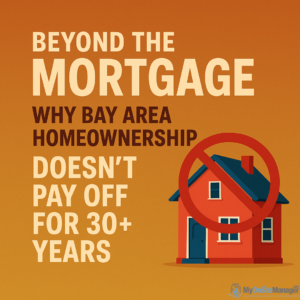For decades, owning a home was a cornerstone of the American Dream. But in the Bay Area, that dream now comes with a shocking twist—you might not financially break even until after three full decades of homeownership. In cities like San Francisco, San Jose, Oakland, and Fremont, recent data reveals that renting is now significantly more cost-effective than buying—at least in the short to medium term.
A San Francisco Chronicle article based on updated NerdWallet calculations shows a massive jump in the break-even period for homeowners—up from 7–20 years in 2023 to more than 30 years in 2024. Let’s explore what’s behind this shift and what it means for current and aspiring homeowners.
What’s Behind the New Break-Even Math?
NerdWallet didn’t just recalculate—it reimagined the entire financial model of homeownership. The latest updates incorporated more realistic assumptions on:
-
Maintenance Costs: Many calculators previously underestimated the price of ongoing repairs and replacements. Now, higher long-term maintenance is baked into the equation.
-
Property Taxes & Insurance: As home prices soar, so do taxes and premiums.
-
Opportunity Cost: The calculator factors in what you could earn by investing your down payment elsewhere instead of tying it up in a house.
-
Flatlining Rent: Rent in many Bay Area cities hasn’t seen the explosive growth of previous years, reducing the comparative value of locking in a mortgage.
This new model shows that while buying may still be emotionally or personally satisfying, it’s far less financially compelling—especially in ultra-high-cost markets.
Bay Area Snapshot: Rent vs. Buy in 2024
Let’s break it down:
-
San Francisco: Buying the median-priced home now only pays off after 32+ years compared to renting.
-
San Jose: Renters stay financially ahead for more than 30 years.
-
Fremont & Oakland: These formerly “closer-to-break-even” cities are now on par with SF when it comes to long-term costs.
Even in Oakland—where home values dropped by 4.7%—the buy-versus-rent calculation still favors renting in the long run. This marks a stark contrast from just a year ago when Oakland offered one of the region’s shortest break-even points.
Experts Weigh In: It’s Not Just About Money
Financial planners, economists, and real estate professionals all agree: the buy-versus-rent decision isn’t purely a numbers game.
“Real estate is personal,” says NerdWallet’s Kate Wood. “If you’re planning to stay in a home for decades, want to customize it, or want the psychological satisfaction of ownership, that’s valid too.”
For many, buying a home isn’t just a financial investment—it’s about stability, pride, and autonomy. However, understanding the financial implications is crucial in setting realistic expectations and making an informed decision.
Should You Still Consider Buying?
Maybe—if your goals are long-term and lifestyle-focused. Despite the numbers, many buyers still choose to enter the market because:
-
They want to plant roots and build equity slowly.
-
They’re optimistic about refinancing when rates drop.
-
They believe housing prices will continue rising long-term.
-
They’re seeking control over their living space (no landlords, no unexpected rent hikes).
Still, others may decide to rent longer, invest their savings elsewhere, or look to more affordable markets where the break-even point is more favorable.
Final Thoughts: A Time to Rethink the Dream?
In a region where even tech workers can feel priced out, the idea that buying only starts paying off after 30+ years may feel disheartening. But it’s also a powerful reminder: the smart move isn’t always the traditional one.
Whether you rent or buy, your best option is the one that aligns with your long-term goals, financial reality, and personal values. As the market continues to evolve, so should the way we think about homeownership.
Source: San Francisco Chronicle – Renting versus buying a home: The math has changed in the Bay Area’s biggest cities

